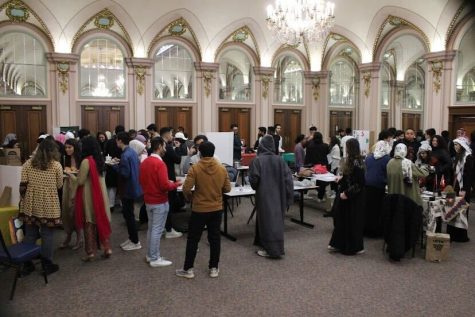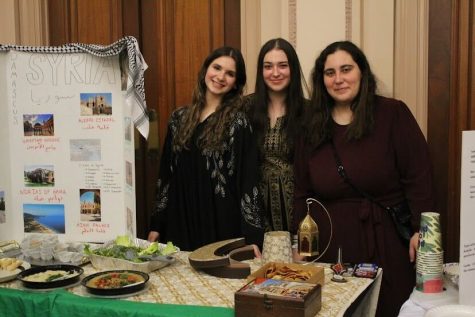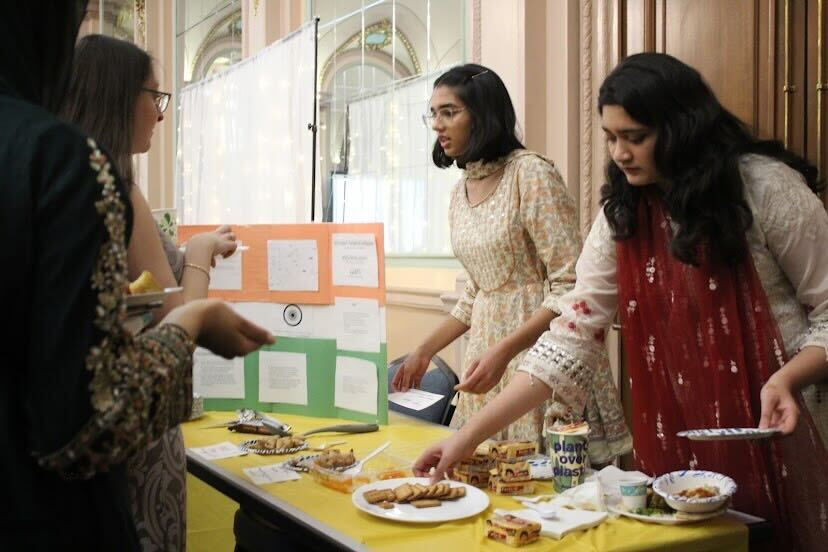MSA at Pitt’s ‘Halal-A-Palooza’ returns to showcase Islam throughout the world
Image courtesy of the Muslim Student Association
Pitt students hand out food at the Indian cultural table during the Muslim Student Association’s Halal-a-palooza in the William Pitt Union on Friday evening.
December 4, 2022
For Muhammed Sillah, a junior molecular biology major and the Muslim Student Association external vice president, the purpose of MSA at Pitt’s “Halal-A-Palooza” is to educate people about Muslim students and the diversity within the Islamic culture.
“I feel like one, as Muslims, we are very misunderstood in general, because everything people learn about Islam is through the media,” Sillah said. “And the media doesn’t talk about the average Muslim who walks and lives a normal life. It’s about extremists who aren’t even Muslim.”
Around 150 attendees gathered in the WPU ballroom to learn more about Islamic culture throughout the world at MSA’s Halal-A-Palooza on Friday. The event made its long-awaited return after being pushed off due to the COVID-19 pandemic. The room was full of booths displaying various Islamic countries’ cultural attire, cuisine and more.
The event first opened with Isha Prayer, which serves as the fifth prayer of the day for Muslims. After the Isha Prayer, the presentation opened with a recitation from the Quran 一 an action that happens at all of MSA’s meetings. The event continued with a special speech from guest speaker, Emiola Oriola, Pitt’s director of the Office of Inclusion and Belonging and manager of the Office of Interfaith Dialogue and Engagement.

Oriola emphasized the ability that students have to make connections with those who may be different from them, whether by race, gender, culture or religion. Using the anecdote of bridges being able to form connections, Oriola drove home his point with his definition of diversity.
“Diversity doesn’t look like anyone,” Oriola said. “It looks like everyone.”
Traveling from booth to booth, attendees discovered more about Islamic countries. The event highlighted countries that members of MSA at Pitt come from including India, Sudan, Kazakhstan and Iraq.
With 15 countries on display, attendees delved into different cultures through their food, clothing, items and history. Ranging all the way from Senegal to India, the fair allowed attendees to learn about cultural attire, taste various country’s delicacies and learn more about Islam throughout the world.
Mariam Amr, a senior psychology major and MSA at Pitt’s event secretary, said each table showcased the role that Islam plays in each country. She said each booth would have an MSA at Pitt member, Middle Eastern and North African Student Association member or a Pitt Arabic Language and Culture Club member ready to inform attendees about their country.
“All the students are going to be representing their country,” Amr said. “They’re going to be making posters, dressing up in cultural clothes, bringing in cultural food, designing their table and making it look all nice, and we’re gonna invite other people in the Pitt community to come in and go through the tables and learn about Islam in each country.”

The booths also showcased states like Palestine, where Islam serves as a major religion for its citizens. The Palestine table highlighted traditional Palestinian clothing, such as thobes, and important cultural dishes like musakhan. Musakhan is a Palestinian dish consisting of flatbread, seasoned chicken, onions and sumac.
Another country featured was Algeria. The North African country, located between Tunisia and Morocco, has national dishes including borek, a fried egg roll filled with chicken, cheese and potatoes. Typically, when Algerian Muslims break their fast at night during Ramadan, they eat borek.
Turkey’s booth showcased several different cultural foods such as börek, a savory pastry filled with cheese; Turkish stuffed grape leaves known as sarma and a dessert called şekerpare, which is a cookie filled with sherbert. The Turkey booth also had a decorative and informative poster and displayed various Turkish items such as a gold ottoman hat, a tea kettle and a Turkish rug.
At the event, attendees like Iman Ahmad, a senior psychology major, learned more about the origins of her fellow MSA at Pitt members.
“I had no idea that we had members from like 30-plus countries,” Ahmad said. “I kind of just assumed that most people were from Pakistan, India, Egypt, Saudi Arabia, Algeria, but I didn’t realize that we had so many members from so many different countries. It’s really cool to learn more about our own members.”
Another attendee, Ayla Saeed, a first-year law, criminal justice and society major, discovered foods from countries other than her own, Pakistan. Saeed said an event like Halal-A-Palooza allows attendees outside of MSA at Pitt to learn more about the club and its students.
“We want to let other people know about our culture, just teach them some things that they might not know about us,” Saeed said. “We’re different, but we all have the connection of us being Muslim.”
Ahmad added that events like Halal-A-Palooza where people can learn about Islam from an “outside perspective” are important because Muslims are a minority in Pittsburgh, and she often feels like they’re underrepresented or there are misconceptions about them in the media.
For Amr, MSA allows fellow Muslim students to come together and find a community within one another.
“We strive for making a home for Muslims that don’t have a home here in Pittsburgh,” Amr said. “Just a place where we feel accepted and feel heard, we can get information that we need, help from others. Our main goal is to educate Muslims and non-Muslims about Islam and just provide that welcoming environment for everyone to come in and feel welcomed and feel heard, accepted and everything. That’s the main thing for Pitt MSA.”








